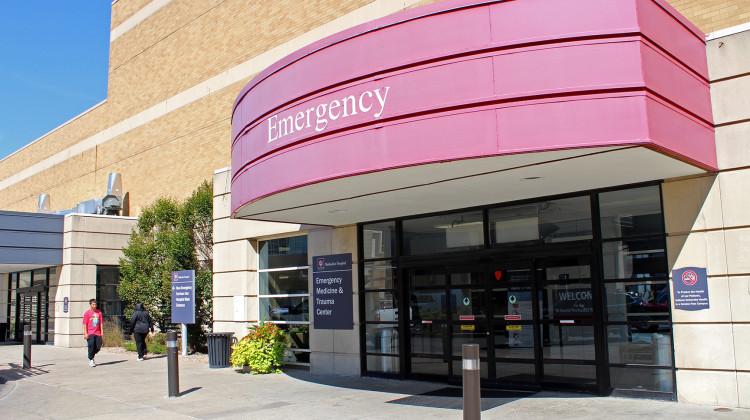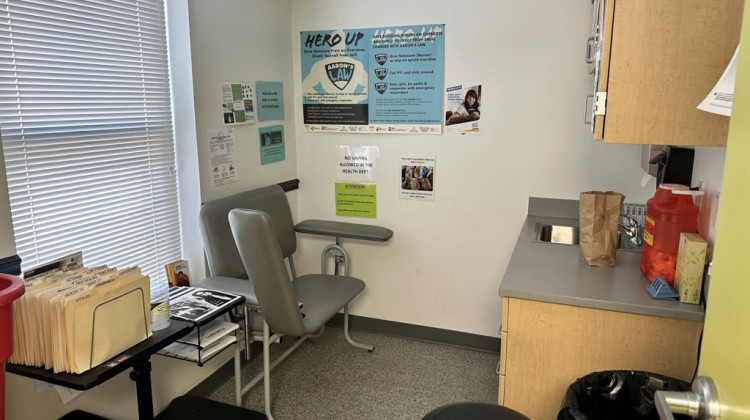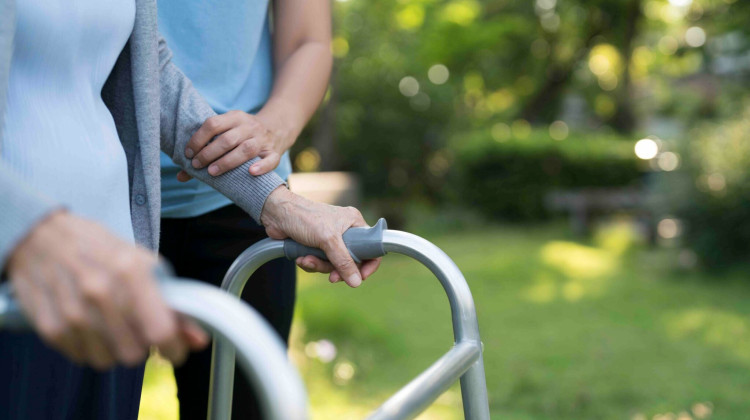
Earlier this year, the Trump administration ended a Biden-era policy protecting so-called sensitive areas like churches, schools, and hospitals from immigration enforcement.
Benjamin Thorp / WFYIIncreased activity from Immigration and Customs Enforcement, or ICE, has made many people without legal status in Indiana fearful of daily life.
Public health experts say a growing number of people are skipping visits to the doctor — even emergency care — because of their fears of deportation. And they're worried these justifiable fears will lead to long-term consequences.
The fear of getting picked up by ICE has become ever-present for people living in Indianapolis without legal status.
One of those people is L, an Indianapolis resident who works at a small business. He did not want his name used for fear of being visited by ICE, and spoke to WFYI through an interpreter.
"There's definitely a lot of police activity and a lot of movement from other officials that make it very scary to go anywhere that you would usually need to go to," L said. "I would definitely think twice before going into a doctor's office at this time."
He said his family has even avoided hardware and grocery stores out of fear.
"It's really sad that we have to question twice before we leave, and have to question so much if we're ever going to see our loved ones again," L said.
Earlier this year, the Trump administration ended a Biden-era policy protecting so-called sensitive areas like churches, schools, and hospitals from immigration enforcement.
"If the place is open to the public, then ICE is part of the public," said Carolyn Grimes, an immigration attorney in Carmel. "So, unless a hospital affirmatively has a policy that says you can't come in, they're allowed to come into a public space."
Grimes said warrants would likely be needed for ICE to go beyond a waiting room, however.
The policies protecting against ICE enforcement entering sensitive areas were meant to protect people seeking essential care, said Natalie Guerrero, assistant professor of pediatrics at the IU School of Medicine.
"Not accessing services early enough, having late detection of disease, late detection of illness, ultimately leads to poor health outcomes, and we know that, and that's been demonstrated time and time again," Guerrero said.
Guerrero said some people aren't accessing care because of their legal status. People without legal status are not eligible for health insurance, either through Medicaid or private insurers, except in some emergency instances.
But she said others might not use benefits they qualify for because they worry it would hurt their applications for things like a Green Card.
When going through the immigration process, the government can consider whether the individual would use public resources, something called the "public charge" rule. But the government has traditionally not penalized using things like SNAP or Medicaid. Immigrants and lawyers worry this could change under the new administration.
Several providers that spoke with WFYI said they were familiar with individuals avoiding care. Guerrero and others described people ignoring back pain or skipping pregnancy appointments — decisions that can leave a lasting impact.
"These families who would otherwise access services and address those illnesses and issues are literally staying home, trying to kind of cure themselves, see if it heals," Guerrero said.
Healthcare clinics have been afraid to take a stance on how they would respond to ICE, noting the funding they receive from the federal government could be jeopardized. Many immigrants, especially those without legal status, have long preferred these clinics and community health centers, which often don't ask about immigration status and treat people regardless of their ability to pay.
But the Trump administration has also pursued changes there, barring some lawfully present people and those without legal status from receiving care at community health centers.
"Should I trust the clinic that I go to? Should I trust the center that I visit?" asked Wendy Catalan with the Undocumented Youth Alliance.
Catalan said the lack of clarity and guidance is part of what worries people.
"We're very transparent in the fact that almost everything is a risk, right?" she said. "Everything. We don't know if you sign up for emergency Medicaid, if that's going to make you a target. We don't."
WFYI asked several hospitals how they would respond to a visit from ICE. They offered varying degrees of clarity.
Some, like IU Health, said law enforcement does not have access to patient care areas without authorization from a court.
Community Health said patient information would require legal documentation, and said law enforcement activity would be conducted in a manner that "minimizes disruption."
Eskenazi Health would not disclose its policies and directed questions to the Indiana Hospital Association. The association said anyone needing immediate care should not delay treatment, but that hospitals adhere to "all state and federal laws" related to immigration enforcement.
Immigration attorney Carolyn Grimes said she hasn't heard of ICE entering a hospital, just yet.
"I, I kind of sadly, have become a little bit more cynical this time in the past nine months with this new administration," Grimes said. "I would say you should probably expect the worst and hope for the best, or like, plan."
For immigrants like L, the ongoing fear of ICE has only increased his existing fear of going to the doctor and waiting to find out afterwards how much it will cost.
"I know many people as well who just opt for staying at home and doing more herbal remedies or homemade remedies," he said.
L says it's just one more thing that makes these visits feel like they're not worth it.
Contact Health Reporter Benjamin Thorp at bthorp@wfyi.org
 DONATE
DONATE








 Support WFYI. We can't do it without you.
Support WFYI. We can't do it without you.